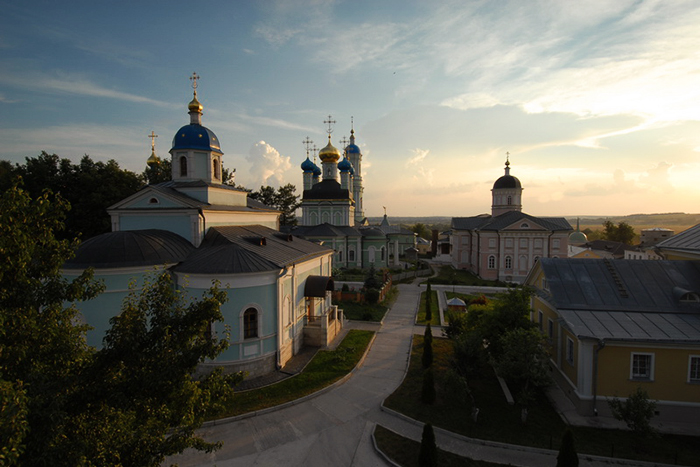
Optina Monastery…
When Eldress Sepphora was reaching her 100th year of life, she walked through the ruins of Optina Monastery in the late 1980s, declaring, “What grace! There is so much grace here!”
Enter the Holy Gates into the ancient monastery founded in the fifteenth century. Breathe in the fragrance of flowers that bloom and delight the eye here, even while throughout the surrounding region the grasses are withering and drying.
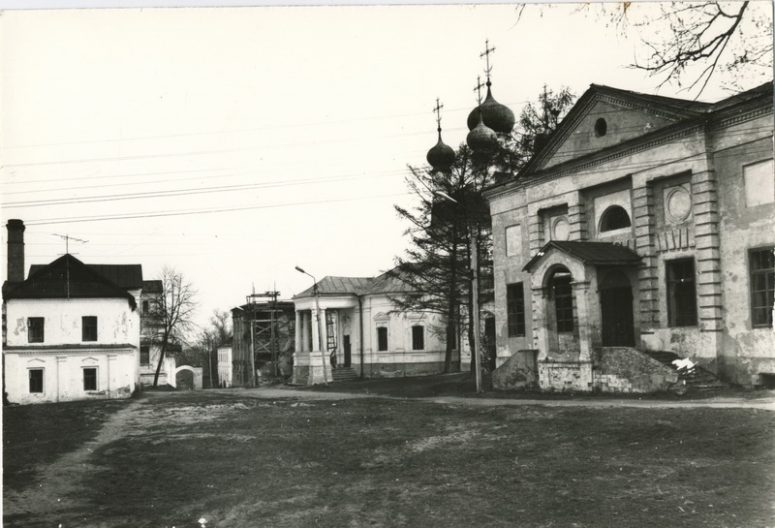
Gaze with admiration at the snow-white church of the Kazan Icon of the Mother of God. A little further down, the sepulcher church of the Vladimir Icon of the Mother of God carefully preserves the relics of seven holy Optina elders. Enter with reverence into the main monastery church—the marvelous and oldest Church of the Entrance of the Mother of God into the Temple, with its great pearl: the reliquary containing the relics of the great monastic saint and miracle-worker, Elder Ambrose of Optina.
Stand motionless for a moment beneath the festal ringing of the Optina bells. Let your soul be at rest from worldly music, and let it be enthralled by the singing of the monastic choir.
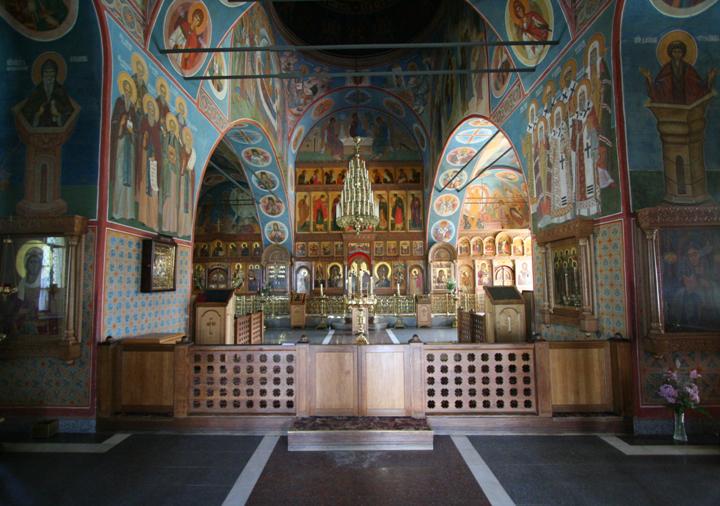
Hundreds of people come to Optina every day. Why do they come? They spend money for the road, are wearied by travel… They are coming to the Optina elders! Remember the saying, “People don’t go to an empty well”?
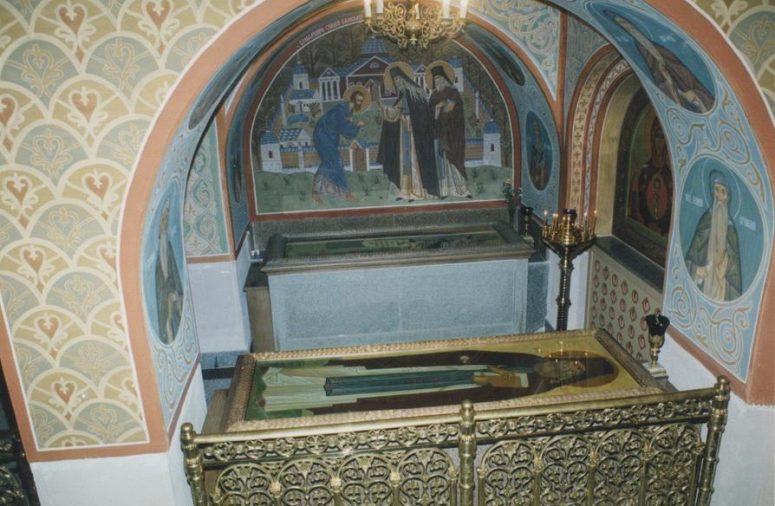
Venerate the relics of the Optina elders. They know everything about us, they know us better than we know and understand ourselves. Penetrating with their spiritual vision into the depth of our souls, they see the past and the future, our pain and sorrow.
The relics are under a heavy stone grave covering… But you can feel a living answer! This is because they continue to lay down their lives for their children! And turning to the holy Optina elders with faith, you are now also under their prayerful protection.
Look around. Isn’t it a beautiful monastery? But in 1988, after sixty-five years of ruin, the first brothers entered these walls and saw only the abomination of desolation in the holy place. Nettles as tall as a man. Smashed gravestones. Churches in ruins. Everything that can be defiled or destroyed was defiled, desecrated, destroyed. But the Lord will not be mocked! Optina has risen from the ashes, and is even more beautiful!
And do you know why? Because man cannot destroy what was created by God’s will!
The mystery of Optina. Make contact with it and try to understand the laws of spiritual life. We often live in fear about tomorrow; we hope in ourselves, our friends and relatives, on credit from banks.

But St. Moses and his brother St. Anthony hoped only in the Lord. As monk-hermits, they came here at the blessing of their Kaluga archpastor, his Eminence Philaret, in 1821. With their own hands they uprooted tree stumps, cleared a parcel of land from the ancient pine trees, built small cells for the brothers and a wooden church dedicated to St. John the Forerunner of Christ.
St. Moses, who was the abbot of Optina for thirty-seven years, often began building projects costing many thousands with only ten to fifteen rubles in the treasury. By our worldly standards it was an improbable, impossible venture.
And that is what practical people told him. But Fr. Moses would say to those practical people who placed all their hope in their pockets, “You’ve forgotten about God. I don’t have the money, but He does.”
Thus in a mysterious manner benefactors appeared and donated this money. And construction went on. Furthermore, father abbot fed all the poor, and helped everyone who came to him with needs.
When Fr. Moses reposed, in the drawer that held the monastery treasury a dime was found, which had rolled over to the side of the drawer. When his brother Fr. Anthony saw it, he just smiled and said, “Eh, batiushka didn’t see the dime, otherwise he would have spent it on the poor!”
Only one dime was left after his death, but Optina was flourishing! Fruit trees, expanded cathedrals, a huge monastery library, new churches, a trapeza, a guesthouse, stables and barns, seven blocks of cells, two factories, a windmill, and the famous white Optina wall.
The mystery of Optina… St. Ambrose of Optina healed the sick and suffering. The healings were without number. And the elder hid these healings however he could. One day a reader who read the prayers was suffering from a bad toothache. Suddenly the elder struck him. Those present giggled, thinking that the reader must have made a mistake in his reading. But in fact, his toothache went away. Knowing the elder, some peasant women would say to him, “Batiushka Abrosim! Hit me! I have a headache.”
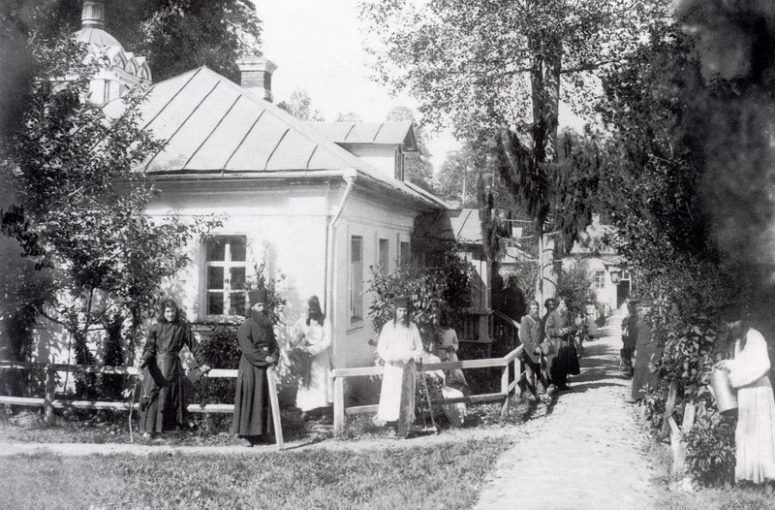
We place great value on our health, take care of it, and wish it for our friends and relatives. But while he healed incurable illnesses and raised the dying from their deathbeds, St. Ambrose himself was so sick that the doctors said, “If you weren’t an elder you would die in a half and hour!” In him were the words fulfilled, “God’s strength is made perfect in weakness.” This is the Optina mystery.
The Optina elders possessed all the gifts of the Holy Spirit: the gift of spiritual discernment, the gift of healing human souls and bodies, the gift of clairvoyance, the gift of prayer so miraculous that it struck like lightning to the heavens. They could call an unknown person by name, read letters without opening them, see a person’s past and future, reveal people’s forgotten sins at confession, return hearing and speech to the deaf and dumb; but they considered the greatest miracle to be the Eucharist, and the greatest gift to be repentance—metanoia.
We want to have a career, to be successful in life, but the brilliant colonel Pavel Ivanovich Plikhanov preferred a modest monastic cell to the rank of general and became St. Barsanuphius.
We struggle to look smart and successful, but St. Nektary hid his foolish-for-Christ with jokes, eccentricity, and unexpected abruptness or unaccustomed simplicity in speaking with highborn and arrogant visitors. He played with toys. He had a bird whistle, and he made grown people blow it when they came to him with empty woes. He had a wolf that he let go on his visitors. He had children’s books that he handed out to grown men and women.
We always try to choose for ourselves the more comfortable living spaces, the easiest work, or the most pleasant vacations; but St. Nikon out of obedience to his abbot became the last Optina elder, knowing that this obedience was a death threat. Seriously ill in exile, he did not ask to be moved to a healthier climate, saying to the doctor, “May God’s will be done…”
And this is all the mystery of Optina.
There were many monasteries where elders labored ascetically, and attained the heights of spiritual life. But only in Optina was the unbroken transmission of eldership; this grace-filled miracle was not interrupted for over one hundred years: from 1829, with Elder Leonid’s move there, to the closing of the monastery in 1923 and the last Optina elders’ martyric end in the 1930s—Sts. Nikon and Isaac II. And this is all a miracle and a mystery.
The Lord wisely arranged that the Optina saints were disciples of elders, and then elders themselves.
How was eldership transmitted from elder to elder?
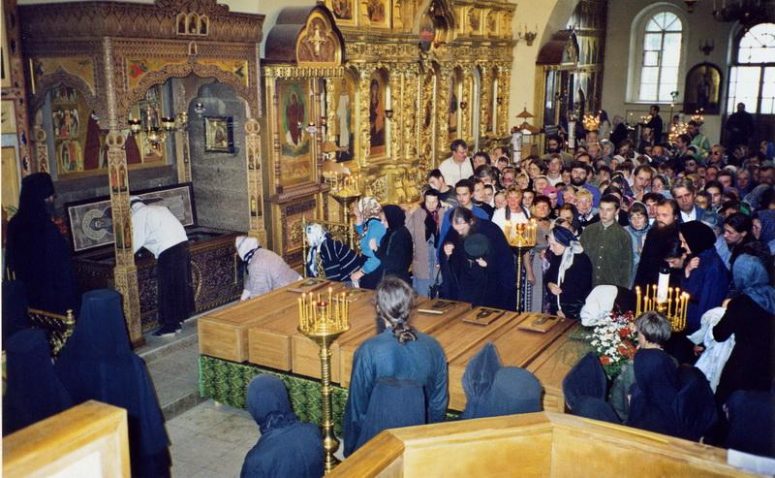
The great elder Ambrose died, and because of the love and loyalty that his spiritual children had for him it was very hard to change to another instructor. But all sensed long ago that the elder’s successor, St. Joseph, was of one spirit with him. Even Fr. Joseph’s outward appearance began to resemble that of Fr. Ambrose, and all could feel this mysterious convergence of the two elders’ souls.
Moreover the awareness that St. Joseph would say precisely what Fr. Ambrose would say, their spiritual oneness, the visible, tangible succession of the great gift of eldership—all this enabled Fr. Joseph to accept the baton of eldership in Optina Monastery.
The Optina elders were different and similar and the same time. Each elder had his own special character—grace does not void individual character traits, particular temperaments, but rather bestows loftiness and spirituality on them, like the setting of a diamond.
The strong-willed, decisive Fr. Leo (Leonid), which bore through all criticism, persecution, and slander like an icebreaker, clearing the waterway for his spiritual children. The lively, affectionate, humorous elder Ambrose, whose gifts make us recall the great elders of the past, resurrecting the dying and healing the hopeless. And St. Macarius was among them “with a pure, loving, humble soul, with a rare combination of simplicity, gentleness, and humility that made him accessible to one and all.
The elders’ paths to Optina Monastery were also different: One came in his youth—St. Joseph who was only twenty-four; and another, St. Barsanuphius, came in his forty-seventh year, when gray hairs were already bounteous on his head.
The Optina elders could be archimandrites, like Sts. Barsanuphius, Moses, Isaac I, and they could be without rank and title—hieromonks, like Sts. Nektary, Joseph, and Hilarion…
The Optina elders cared not only for the monks of the monastery but for all whom the Lord brought to them.
Sometimes it is said that it is enough for laypeople to simply live according to the commandments. Yes, the commandments are given to us, but in life they can be fulfilled in varying circumstances, and in different ways. And it is not always easy to understand what is happening, whether you are having a temptation, or if this is something that the Lord wants from you.
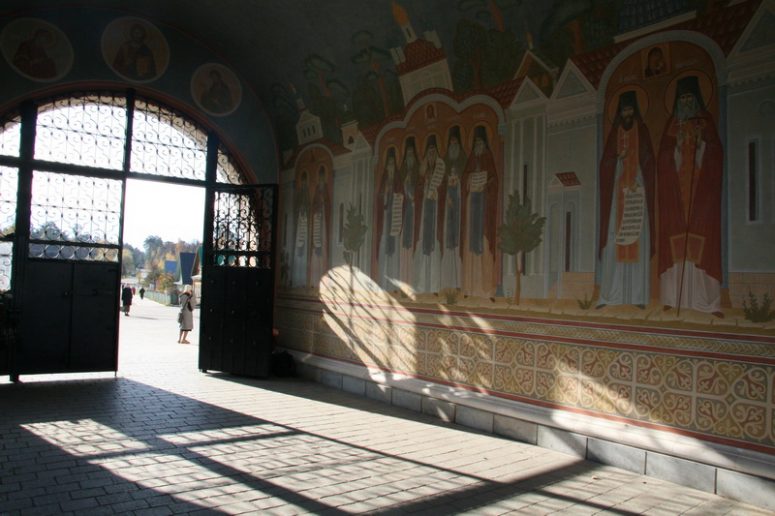
Spiritual life does not mean living in the clouds… It consists in discovering the laws of spiritual life, to the extent that they are applicable to a given person in his situation and conditions. And the Optina elders revealed these spiritual laws to laypeople, helped them understand and make sense of circumstances in spiritual life, and instructed them on the path to salvation.
All the Optina elders were spiritual guides of laypeople. Spiritual guidance and nourishing was given personally and by correspondence, through spiritual instruction.
The Optina elder Joseph wrote, “I believe that every person who comes to Optina Monastery in his extreme need will find satisfaction by the mercy of God… by the prayers of our great fathers.”
Our holy fathers, Optina elders, pray to God for us!


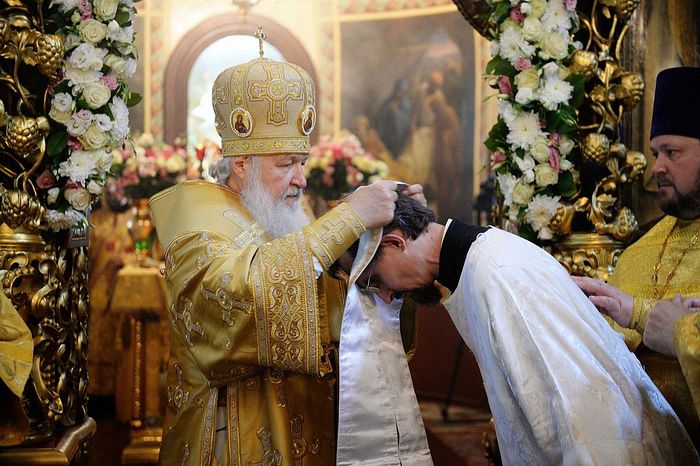
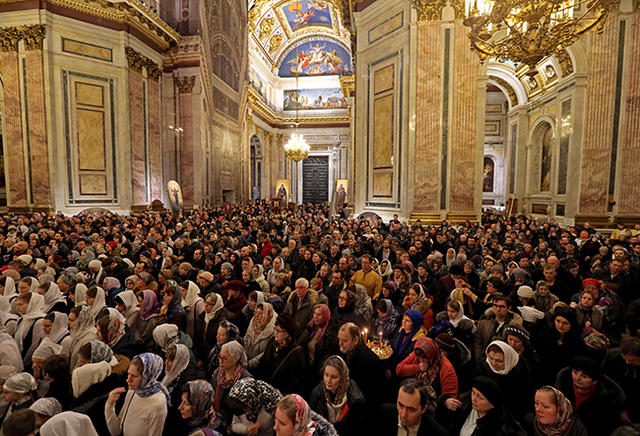
Forwarded from Alton (Fr. John) Koen (linkedin.com/in/alton-fr-john-koen-535b6618a):
Hello, again! Perhaps seeing the article about the Optima Elders was a prompt for me to finally write about the subject of Eldership. I don’t know how things are, currently, in Russia regarding this. But in the USA, it has, over the past several years, become both a widely “popular” topic & “activity”, as well as a matter of grave concern in some quarters (especially with clergy).
Forgive me if I take some time to share with you.
First of all, a word of love & appreciation for the Optima Elders. They have been a great source of hope & inspiration for Matuschka and me. Matuschka was highly inspired by Elder Ambrose, 1st learning of him thru the character of Elder Zosima in “”The Brothers Karamazov”. She also profited greatly, growing up in England, by the radio & tv talks by Metropolitan Anthony (Bloom) of Sourozh (of blessed memory).
(I also profited by contact & talks w/ him, when we were in England).) I received help & inspiration, much earlier on, as I sat out on the path of following Christ, (which eventually led to Orthodoxy), from contact with the Optina Elders. I didn’t know it was them until many years later, in becoming Orthodox. But that’s a story for another time.
Eldership is very real, but there are also very real risks in discerning what is real, & what is not, to do with this. Father Thomas Hopko has spoken out about hazards in this process in America, & his concern over many people abandoning responsibility for their lives in unhealthy, controlling, micro-managing situations with “elders” of dubious provenance. Archbishop Alexander Golitsin has also spoken out about this. He has also given encouraging, clear information, on what Eldership is & is not, drawing on his personal experience with Elder Aemilianos of Mt Athos (of blessed memory).
Based on reading, listening, studying, talking with reliable, experienced people, plus much prayer & contemplation, AND thru personal contact with a few Elders.& Eldresses over many years (many of whom, for various reasons, prefer to remain anonymous), I would respectfully offer the following observations.
1) Eldership is a continuation of the ancient office of Proohet;
2) It has, thru the centuries, appeared in various times & places;
3) It is entirely a gift of the Holy Spirit, totally outside of, & beyond the control of, the outer hierarchical structure & systems of the Church;
4) The Holy Spirit gives this to whom He will, when, where & how He will;
5) It has frequently shown up in monastic settings, but also in lay settings;
6) It is usually preceded by long years of disciplined spiritual life & striving, & ascetic effort. In many situations, it is preceded also by a “master & disciple” training & preparation process. In some circumstances, however, training & preparation are arranged & done by Heaven, mostly in an invisible, but real, manner;
7) True Elders/Eldresses do not advertise. They also do not control, micro-manage, abuse, or seek to take away free will & personal responsibility. They also do not seek power or any kind of inappropriate gain;
8) They are clairvoyant. They hear the thoughts of those around them, more keenly from those who come seeking their help. They also often see into the past &into the future;
9) They are “walking lie detectors;”
10) They can see & discern the deepest thoughts, feelings and motivations of the person in front of them, even if that person does not see or admit to those things;
11) Seeing the foregoing, if the person sincerely wants & seeks help, they can reach into the Heart & Mind of God, & bring forth what absolutely is most & best needed, to help that person;
12) Such an encounter, such an experience can bring great joy, peace, relief, consolation & healing. It can also be profoundly shocking & unsettling & intensely challemging;
13) There is nothing at all romantic about any of this. It touches on & impacts states & matters which are, in reality, matters of Life and/or Death.
14) Some Elders/Eldresses are very gentle, meek & mild. Others are/can be very stern & do not entertain fools lightly. Most will employ humour, if & when needed, but not “light-mindedly”
15) Such contact, if on a real basis. & if finding “good soil” brings deep & profound repentance, change & transformation.
The Inner Way, seeking & working towards Purification, Illumination & Theosis/Deification is arduous & demanding………but extremely worthwhile! The Journey continues! Safe & Blessed Travels to you all! God bless!
Your Unworthy Brother in Christ,
Fr. John Koen
Sent from my T-Mobile 4G LTE device